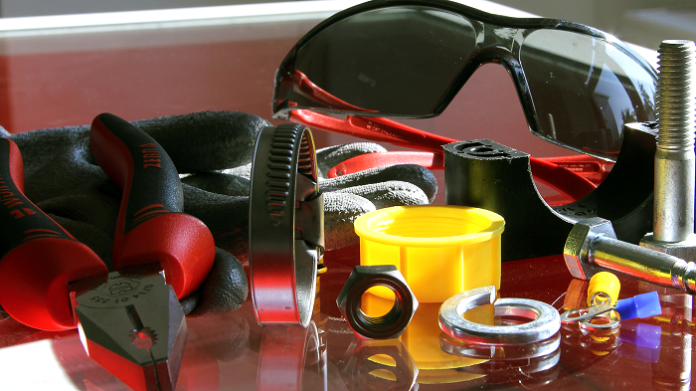The variety of individual needs in production, logistics and materials management is endless. On average, 65-75% of all parts are C-parts. The goal of C-parts management is to cost-effectively organize procurement and management of C-parts. With poor C-parts management, companies end up spending a disproportionate amount of effort and expenses dealing with C-parts.
Wuerth Industrial Services offers made-to-measure logistics supply and service concepts such as storage shelving systems with scanners, automated electronic ordering systems or just-in-time supplies in Kanban bin systems to its customers in the manufacturing industry. The goals are geared clearly towards lowering sourcing costs, optimising processes, reducing costs and maximising time savings while at the same time maximising supply security and minimising capital commitment. ELE Times explored the unique services as the future of manufacturing, with Norman Dentel, CEO – Wuerth Industrial Services India Pvt. Ltd.
Excerpts:

ELE Times: What is servitization, and why are companies around the world adopting this business model transformation?
Norman Dentel: Servitization is viewed as the way in which firms provide an integrated bundle of both goods and services or add extra service components to their core offerings.
It is an innovation of an organization’s capabilities and processes to better create mutual value through a shift from selling products to selling product-service systems. For example, Würth has sold fasteners for many years but realized that our customers need more products and service solutions. Hence we started in 1982 to provide ORSY (Organized Systems) racks at our customers, which was the start of many systemized solutions for our customers. Consequently, instead of just products we “sold” suddenly availability, capacity, supply chain security etc…..the actual product was part of it.
ELE Times: What is digital servitization? What is the servitization of manufacturing?
Norman Dentel: Digital servitization means the shift from a product-centric to a service-centric business model. For example, daily life examples are online streaming platforms as Netflix who provide the service “video” without any physical discs or VHS. Another example is “Uber” which provides taxi services without owning a single taxi or “Airbnb”, renting flats and houses without owning one of them.
ELE Times: Discuss at length the functioning of the new Kanban system for industry 4.0 environment i.e. Kanban 4.0.
Norman Dentel: At Würth we are already in Industry 5.0. While Industry 4.0 is basically all about the ongoing automation and development of traditional manufacturing (examples= self-configuration/ diagnosis, Augmented Reality, Clouds, etc.), Industry 5.0 is the relationship between “(wo)man and machine”. Industry 5.0 combines human creativity and robotic precision, towards unique solutions as the demand of the next decade. One of the major differences is that the connection of machines as in Industry 4.0 will be updated to focus on customer experience.
One in-house example at Würth is that we have developed a Kanban system that connects customers/customer groups and their c-parts database around the globe. How? By a simple click on the code at a Kanban bin at location xyz, we can print 3D items (e.g. tool replacements) at any time anywhere in the world. The customer in the US does not have to be worried that a part is out of stock or has a different quality at one of his locations globally but can be printed anytime. In contrast, the bin always has one immediate replacement available. There are no supply chain or quantity issues for tool replacements anymore. And the best part is that all his facilities globally can access this database to print the same items at the facility. We provide not only the 3D printers and drawing support but also the raw material for the printers. Würth’s Industrial 3D printing services offer a streamlined and efficient method to simplify any supply chain, reduce development times and increase the ability to adapt to customers’ needs. This is the future of manufacturing.
ELE Times: Digitization of the manufacturing industry led by machine learning and data has changed the way it functions. Factories have become more intelligent. What are the IT Solutions Wuerth provides for manufacturing and other industries?
Norman Dentel: With a team of hundreds of colleagues at “Würth Business Services” in Pune (India), we are developing and enhancing the amount of RPA bots globally in different functions. Next, we will work on machine learning and process mining, which results in an idealized picture of a process to be worked on. Additionally, we are providing Augmented Reality and VR solutions with a team of specialists developing software for internal use and external customers. For example, we have developed VR software to train people to climb and repair wind turbines in a very realistic environment.
Additionally, we are using VR rooms to meet customers or/and introduce our vending and replenishment systems to customers since most of our systems are too big to be carried around. This saves time and makes us best in class!
ELE Times: How do you define Wuerth- A one-stop shop? What are the after-sales services?
Norman Dentel: We are not just a fastener provider as you could read before but a holistic provider for all needs of our customers, on all levels at our customers. It goes without saying that screws, nuts, and washers are not the most important industrial system or machine components. However, without a doubt, these small components, i. e. C-Parts are essential for the ultimate product. Although the purchasing volume of these C-Parts is very low, the procurement costs are very high. During boom times with high demand levels, handling repeat orders and coordinating these items for industrial manufacturing companies can be almost overwhelming. This is precisely where Würth comes in with its C-Parts Solutions, Kanban solutions and other modular logistics solutions. Würth offers customized supply and service concepts under the service brand name ‘CPS – C-Parts Solutions’. CPS includes storage and retrieval systems, warehousing, re-stocking and ordering systems, as well as consumption-controlled supply modules such as Kanban and returnable bin systems.
Customers benefit from direct deliveries to their production lines. Innovative Kanban systems with patented bins and RFID technology provide a complete tailor-made solution to meet our customers’ demands. Combining vending expertise with the focus on integrated supply services, the Würth Group always focuses on cost savings through optimized processes . With these cost-saving initiatives, product rationalization, invoice consolidation and accurate management reporting, a reduction of transaction costs and many other financial benefits can be realized. Last but not least, we are also offering Vendor Managed Inventory (VMI) to our customers with third-party items….everything out of one hand!








